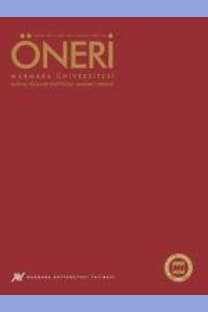OKULÖNCESİ DÖNEM ÇOCUKLARININ SEZGİSEL MATEMATİK YETENEKLERİNİN İNCELENMESİ
Sezgisel Matematik Yeteneği, Okul Öncesi Eğitim, Aile
___
- [1] Yıldırım, C. (1996). Matematiksel Düşünme. İstanbul: Remzi Kitabevi.
- [2] Bruner, J.S. (1983). Intuitive and analytic thinking. (Eds.: Donaldson, M.; Grieve, R. & Pratt, C.). Early Childhood Development and Education: Readiııgs in Psychotogy. Oxford: Basil Blackvvell.
- [3] Mishlove, J. (1995). Intuition : A link between psi and spirituality. ReVision, 18(1), 33-36.
- [4] Baroody, A.J. (1987). Childreıı's Mathematical Thinking; A Developmental Framework for Preschool, Primary, and Special Education Teachers. New York: Teachers College, Columbia University.
- [5] Woolfolk, A.E. (1998). Educational Psychology. 7'1’ Ed. Boston: Allyn ve Bacon.
- [6] Bjorklund, D.F. (1995). Childreıı's Thinking: Developmental Function and Individual Differences. Pacific Grove: Brooks/Cole Publishing Company.
- [7] Saunders, R. & Bingham-Nevvman, A.M. (1984). Piagetian Perspective for Preschools: A Thinking Bookfor Teachers. New Jersey: Prentice-Halljnc,.
- [8] Dixon, J.A. & Moore, C.F. (1996). The developmental role of intuitive principles in choosing mathematical strategies. Developmental Psychology, 32(2), 241-253.
- [9] Farnham-Diggory, S. (1972). Cognitive Processes in Education. New York: Harper & Row Publishers.
- [10] Gardner, H. (198). Frames of Mind: The Theory of Multiple Intelligences. New York: Basic Books,Inc.,
- [11] Harlan, J.D. (1992). Science Experiences for The Early Childhood Years. 5th Ed. New York: Macmillian Publishing Company.
- [12] Crane, J. (1996). Effects of home environment, ses, and maternal test scores on mathematics achievement. The Journal of Educational Research, 89(5), 305-314.
- [13] Verne, A. & Cambell, J.R. The differential effects of family processes and ses on academic self-coııcepts and achievement of gifted asiatı american and gifted caucasian high school students. (http://www.ncela.gwu.edu/ pathways/asian/gifted.htm). [15.03.2005]
- [14] Gadsden, V. & Ray, A. Fathers' role in childreıı’s academic achievement and early literacy. (www.ericdigests.org/2004-3/role.html.2003). [02.02.2005] ,
- [15] Report of the working group on school readiness: improve school readiness and achievement. (www.network.democracy.org/camp/welcome.shtml). [13.01.2005].
- [16] Tepperman, J. How will the growing emphasis on school readiness affect young children? Will it enhance early learning or blame kids for not meeting standards? (www.4.children.org/news/900ready.html.2000). [02.02.2005].
- [17] Güven, Y. (2000). Sezgisel Düşünme ve Matematik: Ev ve Okul Ortamında Uygulama Örnekleriyle. İstanbul: YA-PA Yayınları.
- [18] Güven, Y. (1997). Erken Matematik Yeteneği Testi-2’nin geçerlik, güvenilirlik, norm çalışması ve sosyo-kültürel faktörlerin matematik yeteneğine etkisinin incelenmesi. Yayınlanmamış Doktora Tezi. Marmara Üniversitesi, Sosyal Bilimler Enstitüsü, İstanbul.
- [19] Meece, J.L. (1996). Gender differences in mathematics achievement: the role of motivation. (Ed.: Carr M.). Motivation in Mathematics. New Jersey: Hampton Press Inc.
- [20] Phillips, G.W. Acting commissioner of national çenter for educational statistics. (http://nces.ed.gov/commissioner/ remarks2000). [17.05.2005],
- [21] Ergün, S. (2000). Okulöncesi Eğitimi Alan ve Almayan İlköğretim Birinci Sınıf Öğrencilerinin Matematik Yetenek ve Başarılarının İncelenmesi. Yayınlanmamış Yüksek Lisans Tezi. Marmara Üniversitesi, Sosyal Bilimler Enstitüsü, İstanbul.
- [22] West, J.; Denton, K. & Reaney, L.M. The kindergarten year: findins from the early childhood longitudinal study, kindergarten class of 1998-99. Education Statistics Quarterly. (http://nces.ed.gOv/programs/quarterly/vol_2/2). [27.04.2005].
- [23] Rongjin, H. & Leung, F.K.S. Parental influence on chinese children's mathematics learning. (http://www.math.admu. edu.ph/tsg22/huang.html). [04.05.2005].
- [24] Thorkildsen. R. & Stein, M.R.S. (1998). Is parent involvement related to student achievement?: exploring the evidence. Phi Delta Kappa Çenter for evaluation, development, and research. 22. (http://www.pdkintl.org/ research/rbulletin$/resbul22.htm). [07.06.2007],
- [25] Ginsburg, H. & Pappas, S. (2004). SES, ethnic, and gender differences in young children’s informal addition and subtraction: a clinical interview investigation. Journal of Applied Developmental Psychology, 25(2). 171-192.
- [26] A Production of cognitive achievement in children: Home, school and racial test score gaps. (http://bpp.wharton.upenn.edu/Acrobat/Todd_AEW_paper _2_23_05.pdf). [17.05.2005],
- [27] Student achievement in mathematics — the roles of attitudes, perceptions and family background. (http://www.statcan.ca/english/freepub/81-004-XIE/200500l/math.htm#b). [19.05.2005].
- [28] Chevalier, A. (2003). Parental education and child’s education: A naturel experiment. (http://www.ucd.ie/ economic/staff/achevalier/web/teaching/3Labour/presentati on). [19.05.2005],
- [29] Dickson, L.; Brown, M. & Gibson, O. (1984). Children Learning Mathematics: A Teacher's Guide to Recent Research. Oxford: The Alden Press Ltd.
- ISSN: 1300-0845
- Yayın Aralığı: Yılda 2 Sayı
- Başlangıç: 1994
- Yayıncı: Marmara Üniversitesi
A COMPARISION OF NEURAL NETWORK AND LINEAR REGRESSION FORECASTS OF THE ISE-100 INDEX
L’ESPACE DANS LES ROMANS DE MICHEL BUTOR
TÜRKİYE’DE FAALİYET GÖSTEREN EN BÜYÜK 500 İŞLETME’DE ETİK KODLARI ARAŞTIRMASI
Arzu ÜLGEN AYDINLIK, Dilek DÖNMEZ
OKULÖNCESİ DÖNEM ÇOCUKLARININ SEZGİSEL MATEMATİK YETENEKLERİNİN İNCELENMESİ
VADE YAPILARINA GÖRE YABANCI SERMAYE HAREKETLERİNİN BÜYÜME ÜZERİNE ETKİLERİ: TÜRKİYE ÖRNEĞİ
EMPLOYEE MOTIVATIONIN ORGANIZATIONS USING OUTSOURCING: AN INVESTIGATION IN 5-STAR HOTELS IN ISTANBUL
ÇOCUK ANLATILARINDA KATMERLİ FANTASTİKLER
BEYİN GÖÇÜ VE TÜRKİYE’NİN SOSYO EKONOMİK YAPISININ BEYİN GÖÇÜNE ETKİSİ
RİSKE MARUZ DEĞER (RMD) HESAPLAMA YÖNTEMLERİ: İMKB ÜZERİNE UYGULAMA
TÜRKİYE’DEKİ ENFLASYONUN BAYESCİ VEKTÖR OTOREGRESYON MODELLER İLE İNCELENMESİ
